Unit 1 What’s the matter?Section A GF-4C 课件(共26张PPT)
文档属性
| 名称 | Unit 1 What’s the matter?Section A GF-4C 课件(共26张PPT) |
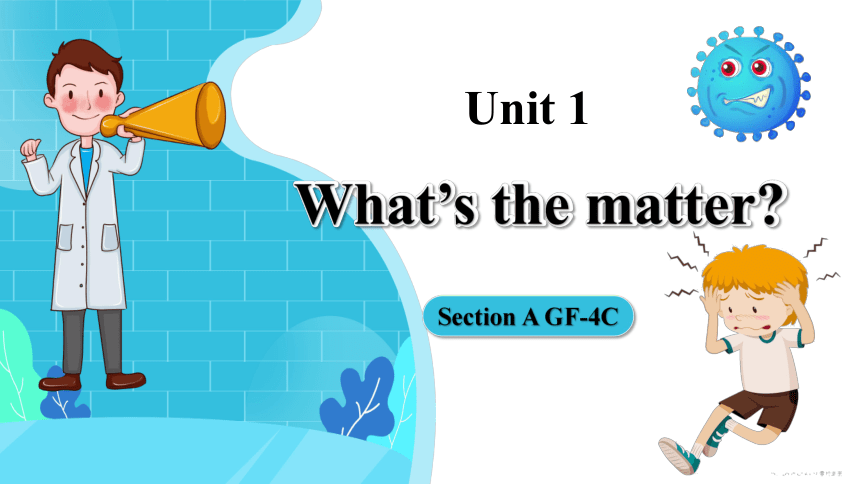
|
|
| 格式 | pptx | ||
| 文件大小 | 28.5MB | ||
| 资源类型 | 教案 | ||
| 版本资源 | 人教新目标(Go for it)版 | ||
| 科目 | 英语 | ||
| 更新时间 | 2024-02-28 00:00:00 | ||
图片预览

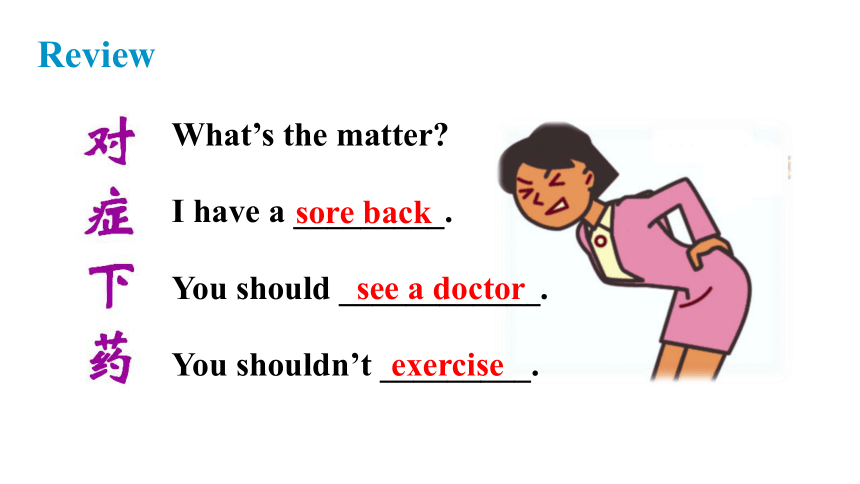
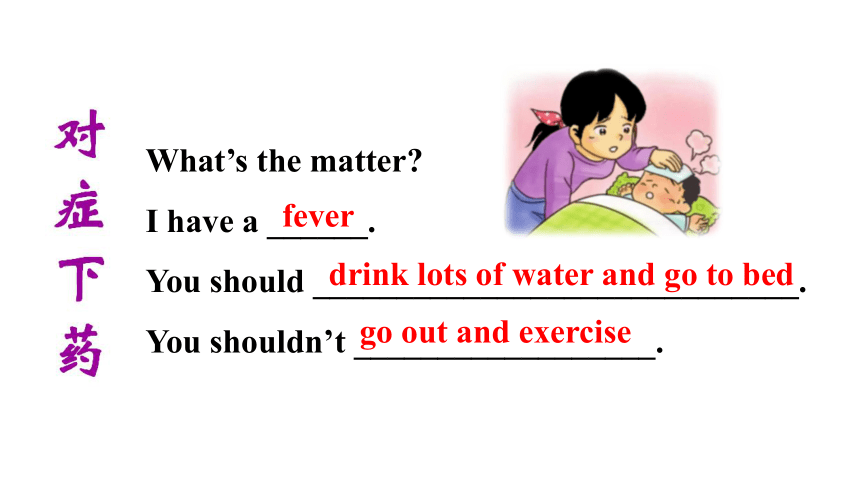

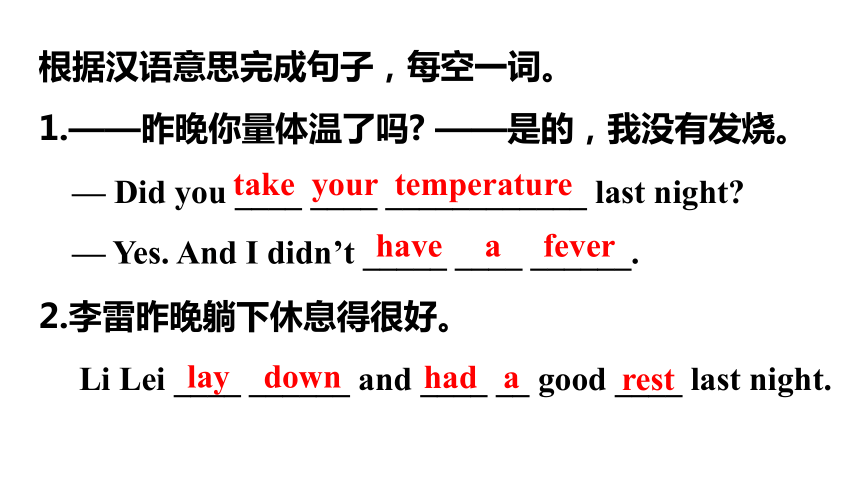
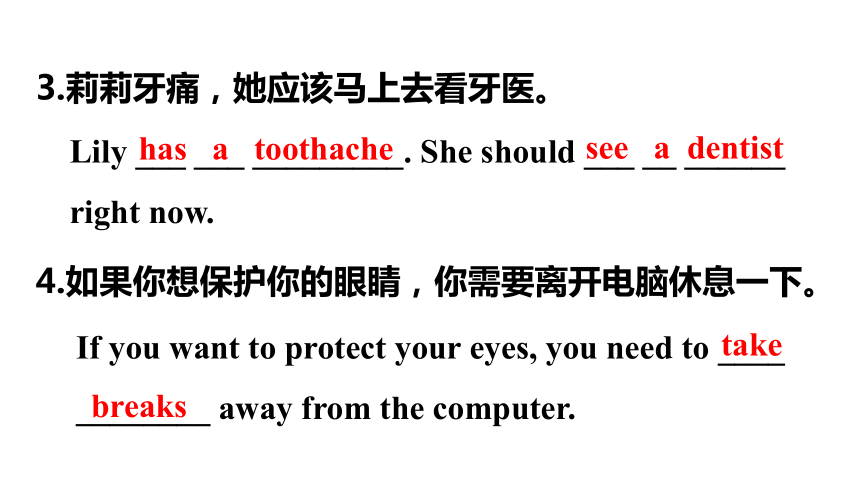
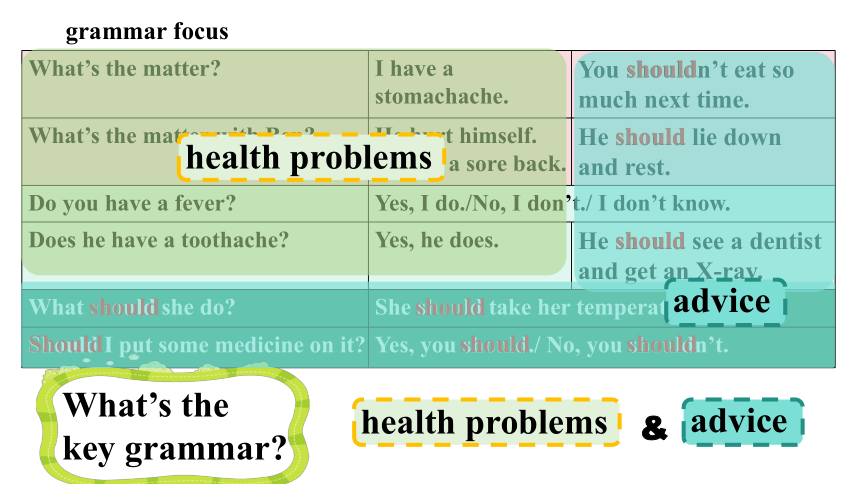
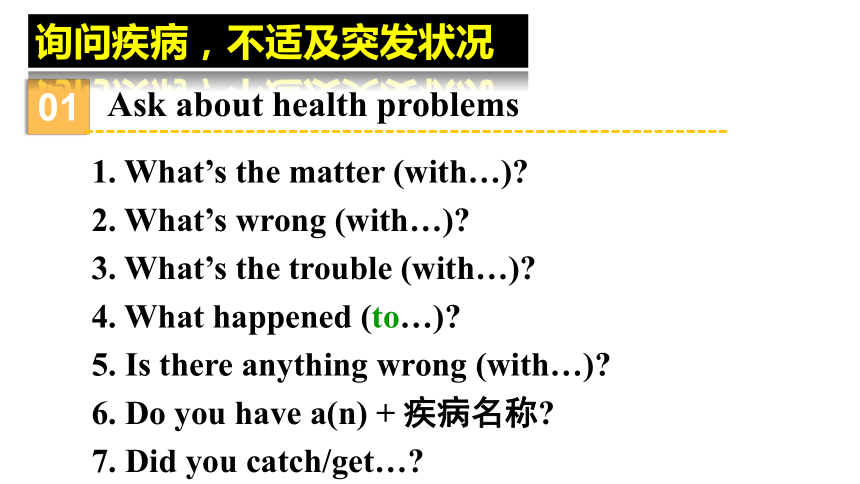
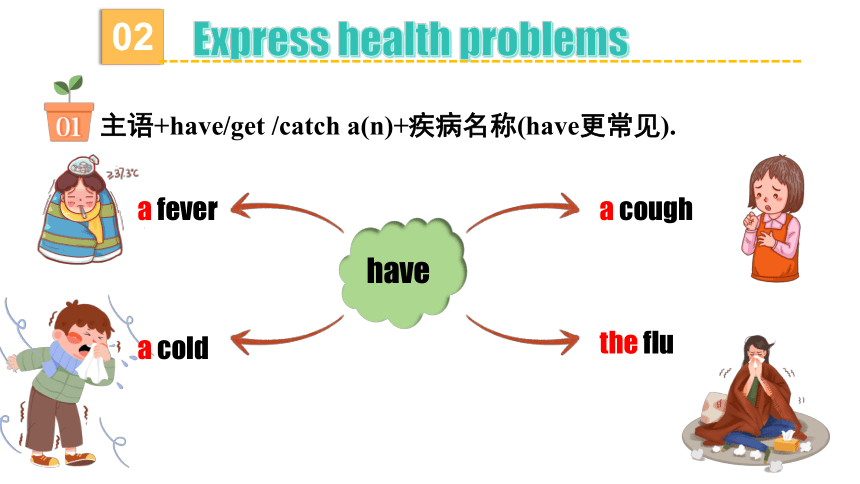
文档简介
What’s the matter
Unit 1 What’s the matter?
Section A GF-4C 课件(共26张PPT)
Review
What’s the matter
I have a _________.
sore back
You should ____________.
see a doctor
You shouldn’t _________.
exercise
What’s the matter
I have a ______.
You should _____________________________.
You shouldn’t __________________.
fever
drink lots of water and go to bed
go out and exercise
A:What’s the matter
B:I have a _____________.
A:You should _______________________.
You shouldn’t _______________________.
stomachache
lie down and have a rest
eat anything for two hours
根据汉语意思完成句子,每空一词。
1.——昨晚你量体温了吗 ——是的,我没有发烧。
— Did you ____ ____ ____________ last night
— Yes. And I didn’t _____ ____ ______.
2.李雷昨晚躺下休息得很好。
Li Lei ____ ______ and ____ __ good ____ last night.
take your temperature
have a fever
lay down
had a
rest
3.莉莉牙痛,她应该马上去看牙医。
Lily ___ ___ _________. She should ___ __ ______ right now.
4.如果你想保护你的眼睛,你需要离开电脑休息一下。
If you want to protect your eyes, you need to ____ ________ away from the computer.
has a toothache
see a dentist
breaks
take
grammar focus
What’s the matter I have a stomachache. You shouldn’t eat so much next time.
What’s the matter with Ben He hurt himself. He has a sore back. He should lie down and rest.
Do you have a fever Yes, I do./No, I don’t./ I don’t know. Does he have a toothache Yes, he does. He should see a dentist
and get an X-ray.
What should she do She should take her temperature. Should I put some medicine on it Yes, you should./ No, you shouldn’t. should
should
should
should
should
should
Should
should
What’s the
key grammar
health problems
advice
&
health problems
advice
Ask about health problems
01
1. What’s the matter (with…)
2. What’s wrong (with…)
3. What’s the trouble (with…)
4. What happened (to…)
5. Is there anything wrong (with…)
6. Do you have a(n) + 疾病名称
7. Did you catch/get…
询问疾病,不适及突发状况
Express health problems
主语+have/get /catch a(n)+疾病名称(have更常见).
have
a fever
a cough
a cold
the flu
02
主语+have/has+a+身体部位-ache.
have a
toothache
stomachache
headache
backache
主语+have/has+a+sore+发病部位.
have a
sore
arm
hand
knee
throat
cut /hurt / break +one’s 身体部位
cut
hurt
break
hand
knee
break
leg
探究二
Grammar
Express health problems
There is something wrong with one’s +部位.
There is something wrong
with my/ his/ her...
eye
ear
take one’s temperature
take some medicine/ an injection (注射)
lie down and rest/ take breaks
take/get an X-ray
see the dentist/doctor/go to a doctor
go to (the) hospital
eat cold food/ stay up late…
03
Give advice:
You should/shouldn’t…
2.---What's the matter with Ben
--- He _______________. He_______________.
--- Ben怎么了?
--- 他伤着了自己,他背疼。
hurt himself
1.---What's the matter
--- I ___________________.
--- 怎么了?
--- 我肚子疼。
have a stomachache
has a sore back
3.---Does he _______________ ---他牙痛吗?
---Yes, he does. ---是的。
have a toothache
I didn’t have breakfast this morning, so a ______ comes to me.
A. headache B. backache C. toothache D. stomachache
D
小试牛刀
Should 的用法:
表示建议或劝告,意为“应该”。
You should lie down and have a rest.
表示义务或责任,意为“应该”。
You should study hard at school.
表示要求或命令,意为“应该”。
You should make your bed on time.
1. 肯定句:________________________________
2. 否定句: _______________________________
3. 一般疑问句:____________________________ ________________________________________
4. 特殊疑问句:________________________________________
should的基本句式
主语 + should + V原 + 其它.
主语 + shouldn't + V原 + 其它.
Should + 主语 +V原 + 其它
特殊疑问词 + should + 主语 +V原 + 其它
—Yes, 主语 + should. / —No, 主语 + shouldn't.
反身代词:是一种表示反射或强调的代词。有人称和数之分。它由第一人称、第二人称的形容词性物主代词和第三人称代词的宾格词尾加-self或-selves构成,意为“本人;本身”。
反身代词的用法
第一人称 第二人称
第三人称
单数
复数
myself
yourself
himself herself
itself
ourselves
yourselves
themselves
1. 反身代词作宾语
作介词的宾语,常用于 by, except, to, for 等后面
Jeeny said to herself, “What should I do ”
珍妮自言自语:“我该怎么办呢?”
The old man lives by himself in the countryside.
这位老人一个人生活在乡下。
2. 反身代词的常用短语
照顾自己 玩得高兴,
过得愉快
enjoy oneself
弄伤自己
hurt oneself
介绍……自己
introduce oneself
给自己穿衣服
dress oneself
独自地,独立地
by oneself
You can’t taste Lu Xun’s writing style until you read his works for ________.
A. yourself B. myself C. himself D. itself
A
look after oneself / take care of oneself
语法精练
1. You look so weak! I think you _____ go to see a
doctor at once.
A. might B. should C. could
2. To keep children away from danger during the
coming summer holiday, parents _____ give them
some safety tips.
A. should B. may C. could D. might
3. We enjoyed ______at the English party last
weekend.
A. us B. our C. ours D. ourselves
4. How delicious! Did the students make the fruit
salad all by ______
A. they B. them C. their D. themselves
4a Fill in the blanks and practice the conversation.
1.A: I hurt ______ when I played basketball yesterday. What ______ I do
B: You ______ see a doctor and get an X ray.
2.A:______ the matter
B: My sister and I ____ sore throats. ______ we go to school
A: No, you ________.
3.A: _____ Mike _____ a fever
B: No, he ________. He ___ a stomachache.
A: He ______ drink some hot tea.
myself
should
should
What’s
have
Should
shouldn’t
Does
have
doesn’t
has
should
1. Jenny cut herself. She should (get an X-ray / put some medicine on the cut).
My advice: ______________________________.
2. Kate has a toothache. She should (see a dentist / get some sleep).
My advice: _____________________________________.
3. Mary and Sue have colds. They shouldn’t (sleep/ exercise).
My advice: _______________________________________.
4. Bob has a sore back. He should (lie down and rest / take his temperature).
My advice: ______________________.
Circle the best advice for these health problems.
Then add your own advice.
4b
She should/ shouldn’t ...
She should brush teeth at least twice a day
They should have a rest and drink hot water
He should/ shouldn’t ...
Suppose your best friends are not feeling well. What will you talk
Make up a new conversation.
A: .... , are you OK / You don’t look well./You look bad.
B: I ... What should I do Should I ...
A: What did you do ...
B: I...
A: That’s probably why...
I think you need to .../I think you should ...
If ..., then ....
B: OK. Thanks. / That sounds a good idea./
Yes, you’are right.
Self checklist:
correct language
proper advice
proper body language
Tips:
1. Talk about the problems ,the cause(起因)and the advice.
2. Ask questions and give responses.
Thanks!
Unit 1 What’s the matter?
Section A GF-4C 课件(共26张PPT)
Review
What’s the matter
I have a _________.
sore back
You should ____________.
see a doctor
You shouldn’t _________.
exercise
What’s the matter
I have a ______.
You should _____________________________.
You shouldn’t __________________.
fever
drink lots of water and go to bed
go out and exercise
A:What’s the matter
B:I have a _____________.
A:You should _______________________.
You shouldn’t _______________________.
stomachache
lie down and have a rest
eat anything for two hours
根据汉语意思完成句子,每空一词。
1.——昨晚你量体温了吗 ——是的,我没有发烧。
— Did you ____ ____ ____________ last night
— Yes. And I didn’t _____ ____ ______.
2.李雷昨晚躺下休息得很好。
Li Lei ____ ______ and ____ __ good ____ last night.
take your temperature
have a fever
lay down
had a
rest
3.莉莉牙痛,她应该马上去看牙医。
Lily ___ ___ _________. She should ___ __ ______ right now.
4.如果你想保护你的眼睛,你需要离开电脑休息一下。
If you want to protect your eyes, you need to ____ ________ away from the computer.
has a toothache
see a dentist
breaks
take
grammar focus
What’s the matter I have a stomachache. You shouldn’t eat so much next time.
What’s the matter with Ben He hurt himself. He has a sore back. He should lie down and rest.
Do you have a fever Yes, I do./No, I don’t./ I don’t know. Does he have a toothache Yes, he does. He should see a dentist
and get an X-ray.
What should she do She should take her temperature. Should I put some medicine on it Yes, you should./ No, you shouldn’t. should
should
should
should
should
should
Should
should
What’s the
key grammar
health problems
advice
&
health problems
advice
Ask about health problems
01
1. What’s the matter (with…)
2. What’s wrong (with…)
3. What’s the trouble (with…)
4. What happened (to…)
5. Is there anything wrong (with…)
6. Do you have a(n) + 疾病名称
7. Did you catch/get…
询问疾病,不适及突发状况
Express health problems
主语+have/get /catch a(n)+疾病名称(have更常见).
have
a fever
a cough
a cold
the flu
02
主语+have/has+a+身体部位-ache.
have a
toothache
stomachache
headache
backache
主语+have/has+a+sore+发病部位.
have a
sore
arm
hand
knee
throat
cut /hurt / break +one’s 身体部位
cut
hurt
break
hand
knee
break
leg
探究二
Grammar
Express health problems
There is something wrong with one’s +部位.
There is something wrong
with my/ his/ her...
eye
ear
take one’s temperature
take some medicine/ an injection (注射)
lie down and rest/ take breaks
take/get an X-ray
see the dentist/doctor/go to a doctor
go to (the) hospital
eat cold food/ stay up late…
03
Give advice:
You should/shouldn’t…
2.---What's the matter with Ben
--- He _______________. He_______________.
--- Ben怎么了?
--- 他伤着了自己,他背疼。
hurt himself
1.---What's the matter
--- I ___________________.
--- 怎么了?
--- 我肚子疼。
have a stomachache
has a sore back
3.---Does he _______________ ---他牙痛吗?
---Yes, he does. ---是的。
have a toothache
I didn’t have breakfast this morning, so a ______ comes to me.
A. headache B. backache C. toothache D. stomachache
D
小试牛刀
Should 的用法:
表示建议或劝告,意为“应该”。
You should lie down and have a rest.
表示义务或责任,意为“应该”。
You should study hard at school.
表示要求或命令,意为“应该”。
You should make your bed on time.
1. 肯定句:________________________________
2. 否定句: _______________________________
3. 一般疑问句:____________________________ ________________________________________
4. 特殊疑问句:________________________________________
should的基本句式
主语 + should + V原 + 其它.
主语 + shouldn't + V原 + 其它.
Should + 主语 +V原 + 其它
特殊疑问词 + should + 主语 +V原 + 其它
—Yes, 主语 + should. / —No, 主语 + shouldn't.
反身代词:是一种表示反射或强调的代词。有人称和数之分。它由第一人称、第二人称的形容词性物主代词和第三人称代词的宾格词尾加-self或-selves构成,意为“本人;本身”。
反身代词的用法
第一人称 第二人称
第三人称
单数
复数
myself
yourself
himself herself
itself
ourselves
yourselves
themselves
1. 反身代词作宾语
作介词的宾语,常用于 by, except, to, for 等后面
Jeeny said to herself, “What should I do ”
珍妮自言自语:“我该怎么办呢?”
The old man lives by himself in the countryside.
这位老人一个人生活在乡下。
2. 反身代词的常用短语
照顾自己 玩得高兴,
过得愉快
enjoy oneself
弄伤自己
hurt oneself
介绍……自己
introduce oneself
给自己穿衣服
dress oneself
独自地,独立地
by oneself
You can’t taste Lu Xun’s writing style until you read his works for ________.
A. yourself B. myself C. himself D. itself
A
look after oneself / take care of oneself
语法精练
1. You look so weak! I think you _____ go to see a
doctor at once.
A. might B. should C. could
2. To keep children away from danger during the
coming summer holiday, parents _____ give them
some safety tips.
A. should B. may C. could D. might
3. We enjoyed ______at the English party last
weekend.
A. us B. our C. ours D. ourselves
4. How delicious! Did the students make the fruit
salad all by ______
A. they B. them C. their D. themselves
4a Fill in the blanks and practice the conversation.
1.A: I hurt ______ when I played basketball yesterday. What ______ I do
B: You ______ see a doctor and get an X ray.
2.A:______ the matter
B: My sister and I ____ sore throats. ______ we go to school
A: No, you ________.
3.A: _____ Mike _____ a fever
B: No, he ________. He ___ a stomachache.
A: He ______ drink some hot tea.
myself
should
should
What’s
have
Should
shouldn’t
Does
have
doesn’t
has
should
1. Jenny cut herself. She should (get an X-ray / put some medicine on the cut).
My advice: ______________________________.
2. Kate has a toothache. She should (see a dentist / get some sleep).
My advice: _____________________________________.
3. Mary and Sue have colds. They shouldn’t (sleep/ exercise).
My advice: _______________________________________.
4. Bob has a sore back. He should (lie down and rest / take his temperature).
My advice: ______________________.
Circle the best advice for these health problems.
Then add your own advice.
4b
She should/ shouldn’t ...
She should brush teeth at least twice a day
They should have a rest and drink hot water
He should/ shouldn’t ...
Suppose your best friends are not feeling well. What will you talk
Make up a new conversation.
A: .... , are you OK / You don’t look well./You look bad.
B: I ... What should I do Should I ...
A: What did you do ...
B: I...
A: That’s probably why...
I think you need to .../I think you should ...
If ..., then ....
B: OK. Thanks. / That sounds a good idea./
Yes, you’are right.
Self checklist:
correct language
proper advice
proper body language
Tips:
1. Talk about the problems ,the cause(起因)and the advice.
2. Ask questions and give responses.
Thanks!
同课章节目录
- Unit 1 What's the matter?
- Section A
- Section B
- Unit 2 I'll help to clean up the city parks.
- Section A
- Section B
- Unit 3 Could you please clean your room?
- Section A
- Section B
- Unit 4 Why don't you talk to your parents?
- Section A
- Section B
- Unit 5 What were you doing when the rainstorm came
- Section A
- Section B
- Review of Units 1-5
- Unit 6 An old man tried to move the mountains.
- Section A
- Section B
- Unit 7 What's the highest mountain in the world?
- Section A
- Section B
- Unit 8 Have you read Treasure Island yet?
- Section A
- Section B
- Unit 9 Have you ever been to a museum?
- Section A
- Section B
- Unit 10 I've had this bike for three years.
- Section A
- Section B
